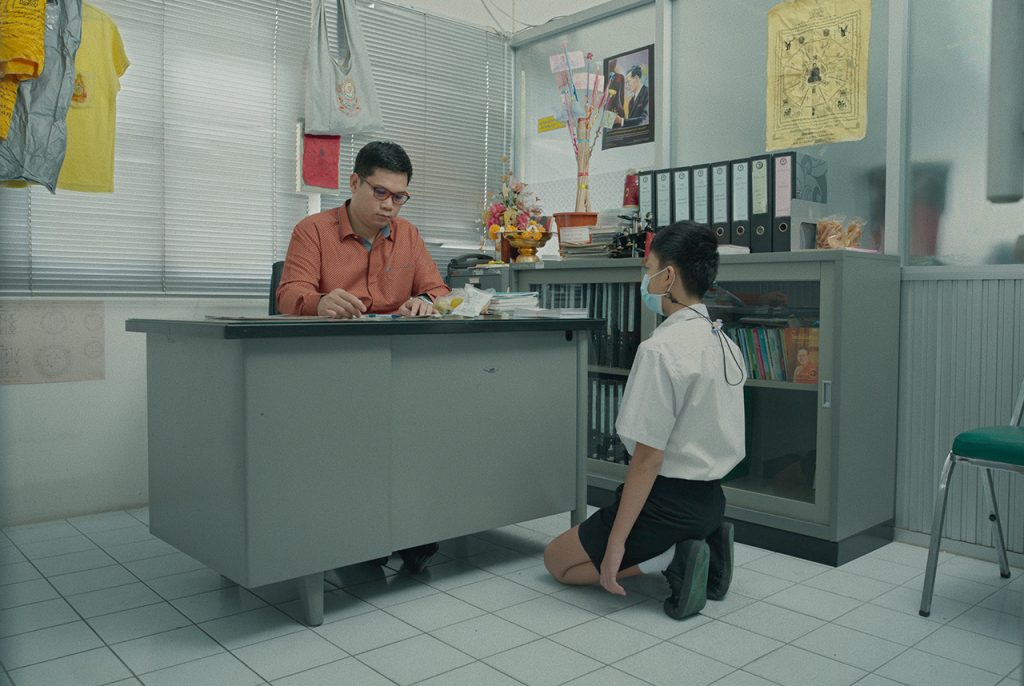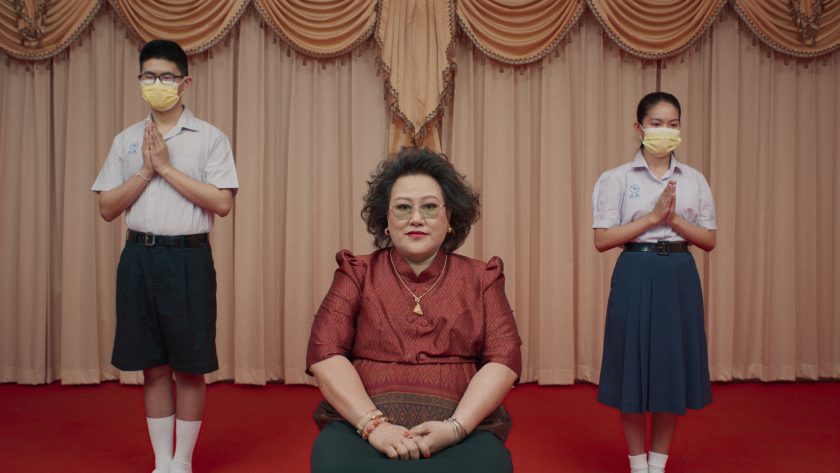Anya Somwaiya reviews Sorayos Prapapan’s comic portrait of Thai culture and the doctrines of education.
Prapapan, in his pilled zip-up and wrinkled tie-dye tee at the New York Film Festival, states that Arnold is a Model Student (2022, AIAMS), funded by the Thai government’s art commission, shows how dictatorship starts in our schools. Growing up in Thai school myself, I’d say I was relatively primed for a life under authoritarianism, and the movie’s jabs, caricatures, grotesques and ironic visuals felt like the glorious, anti-establishment jerk that I had been seeking from Thai discourse and cinema. AIAMS’s formalised frames, uniform colours and planimetric compositions mirrors the goofiness and absurdity of suffering under the hierarchical systems of Thai society, with permed ladies bearing the droit of Buddhist virtue, bamboo canes in hand above it all. Prapapan’s message delivered in snide, and at times didactic, humour confirmed I too had suffered under several Miss Wanee’s of my own.
Post-screening, I asked Thais around 10 years my senior – being myself 18 at the time – for their thoughts on the film. Eyes clouded in thought one young man mused,
“It’s a little hard for me to accept. I hadn’t thought of it until now, that anything they did to us in school was wrong. I don’t know, I’m still thinking about it.”

I’d thought about how, being raised by an American mother, I may have had a different reference point and could look into things, see their strangeness with some clarity, with an ability to give them a name. My teachers picked on me for this. They said I didn’t understand Thainess and how to listen to orders, because I was farang (i.e. foreign, American, white…). With the popularity of the Thai pro-democracy movement in circles of people my age and older in recent years, it hadn’t occurred to me that there was still a disconnect. That we hadn’t all grown up and looked back on school and either laughed, cried or shouted about how insane our dharma-thumping, slut-shaming, monarchy-lauding, virtue-peddling teachers were. It made me reconsider that Prapapan’s film was funny and comforting in its affirming for frustrated folks like myself, but it also possessed a necessary, pedagogic nature. The kids of Prapapan’s imagined school are actively in revolt. Arnold is not, he’s won all the awards and will be off to school in America next year anyways. Not only will he be better off with his shiny, foreign degree than the friends he’s always slumming about smoking with, but he won’t have to be at home making Thailand a place he wants to actually be. Curiously, Arnold’s half-white American too, but he’s been tokenised and ‘reverse-colonised’. His public-facing acceptance of the school’s antics legitimise them, because if the white kid accepts it, why can’t you? Prapapan highlights the irony of our post-colonial hang-ups. The traditionalist Thai hatred of foreign influence goes hand in hand with a deification of the west. Arnold joining a cheating ring and sitting exams to help kids cheat for a cheque is another metaphorical device used by Prapapan. Arnold is a Model student, but most of us will never be Arnold. To be as good and perfect as Arnold, we’d have to pay an agent 20,000 baht to read off his test answers. Most of us will never be at the top of a class tier-list, or get any of the good treatment from our cane-wielding masters that comes along with the position. So, how will the common students, or people fare under a governmental system of even poorer social mobility? AIAMS is a film you laugh all the way through at. The Pyongyang-esque “How To Have Manners” montage sequence’s plays on absurdity was enough to get the audience to do just that … their laughs did make look around the theatre of Americans and wonder “Now do they understand?”.




